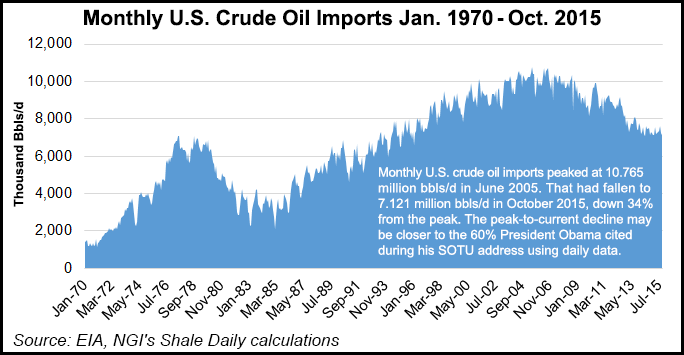Regulatory | NGI All News Access | NGI The Weekly Gas Market Report
Obama Mum On NatGas in Final State of the Union
In his final State of the Union address Tuesday, President Obama touted America’s success in developing renewables like wind and solar but, unlike previous speeches, omitted any reference to the role of natural gas in securing the nation’s energy future.

While detailing the results of the nation’s investments in renewable energy in recent years, Obama boasted that “wind power is now cheaper than dirtier, conventional power” and that the solar industry now “employs more Americans than coal — in jobs that pay better than average.” But without mentioning the shale revolution or the growth in domestic fossil fuel production during his presidency, Obama said, “Meanwhile, we’ve cut our imports of foreign oil by nearly 60%, and cut carbon pollution more than any other country on Earth.”
Obama called for the nation to “accelerate the transition away from dirty energy. Rather than subsidize the past, we should invest in the future — especially in communities that rely on fossil fuels. That’s why I’m going to push to change the way we manage our oil and coal resources, so that they better reflect the costs they impose on taxpayers and our planet.”
Obama’s discussion of energy Tuesday pointed to a tonal shift from his administration that was apparent in the revised version of the Environmental Protection Agency’s (EPA) Clean Power Plan (CPP) released last summer. Unlike the draft version of the rule, the final CPP largely glossed over the importance of natural gas as a bridge fuel to lowering carbon emissions and instead pushed for a jump straight to renewables (see Daily GPI, Aug. 3, 2015).
In a note published Tuesday prior to Obama’s speech, the Cato Institute’s Ned Mamula and Patrick J. Michaels criticized the administration for making an about-face on the role of gas in U.S. climate policy.
“The June 2014 draft stated that natural gas would be the bridge fuel until renewables were viable on their own,” they wrote. “But during the year the CPP was in draft form, Obama gave in to the radical environmentalists. When the CPP came out in final form last June, it became clear that the switch from coal to gas was largely over. Early last year, the fraction of our power produced by gas reached 31%. The CPP caps it at 33%, basically the same figure.”
In a conference call with reporters in the lead-up to Tuesday’s address, American Petroleum Institute (API) President Jack Gerard was critical of the Obama administration’s apparent favoritism toward renewables while ignoring the carbon reductions achieved through burning natural gas.
“They rely on us still because they know they have to,” Gerard said. “That’s the point I’m trying to make. Let the market sort it out. They’re putting their fingers on the scale and they’re picking winners and losers. They’re trying to enhance a particular form of energy, when in reality they know they have to rely” on gas. “Yet they’re still through their regulatory regimes trying to tip the scales to pick their preferred friend and family, if you will.”
Western Energy Alliance President Tim Wigley highlighted the conspicuous absence of gas in Obama’s speech.
“The president still fails to accept one basic fact about climate change: The United States has dramatically reduced greenhouse gas emissions, more than other developed countries, primarily because of increased use of natural gas. It’s not because of wind or solar,” Wigley said. “Yet Obama’s legacy will be overreaching regulations designed to constrict production of oil and natural gas in favor of unreliable alternatives.”
Also chiming in on Obama’s final State of the Union speech, American Gas Association (AGA) President Dave McCurdy urged the administration to look to gas as a key component of emissions reductions moving forward.
“President Obama is taking aggressive action at home and abroad to reverse the effects of climate change,” McCurdy said. “The United States has a credible leadership role on this issue, in part, because of the country’s abundant supply of natural gas and the adoption of aggressive fuel economy standards that have led to significant and continued declining emissions. Natural gas is part of the solution to climate change and will help the United States make progress toward ambitious emissions reductions targets.”
© 2024 Natural Gas Intelligence. All rights reserved.
ISSN © 1532-1231 | ISSN © 2577-9877 | ISSN © 1532-1266 |
